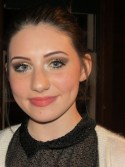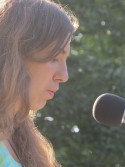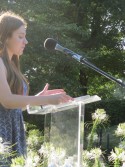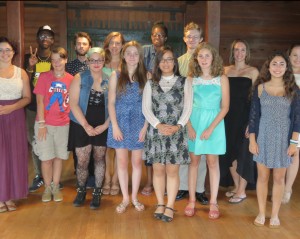 For 23 years, Hill-Stead Museum has offered a unique opportunity to Connecticut high school students through the Fresh Voices Poetry Competition. Last year we welcomed nearly 100 competitors from all corners of the state and we expect even more entries this year. Not only has the number of entries increased, the quality of the poetry we receive each year is remarkable and seems to consistently exceed expectation.
For 23 years, Hill-Stead Museum has offered a unique opportunity to Connecticut high school students through the Fresh Voices Poetry Competition. Last year we welcomed nearly 100 competitors from all corners of the state and we expect even more entries this year. Not only has the number of entries increased, the quality of the poetry we receive each year is remarkable and seems to consistently exceed expectation.
Join us at Hill-Stead on August 5, 2017 – CT Young Poets Day of the Sunken Garden Poetry Festival, to hear this year’s winning poets—an event that is sure to impress and inspire you. For more information see Sunken Garden Poetry.
In this month’s issue of Theodate we present the winning poets from the 2015 Fresh Voices Poetry Competition. Please click on a name below to read poetry by that author, or scroll down to read all poems.
2015 Winning Poets
- Cole Adams, Kingswood-Oxford
- Avery Christensen, Rockville High School
- Khadija Hussain, Wilber Cross High School
- Joscelyn Norris, Westover
- Kaleigh Perkins, Rockville High School
2015 Fresh Voices Winners
 Cole Adams, Kingswood-Oxford
Cole Adams, Kingswood-Oxford
Cole is a recent graduate of West Hartford’s Kingswood Oxford School. He is attending Brown University in the fall, where he plans to major in English, though he’s also “down” with art history and mathematics. At KO, he led two different social justice organizations and expects to continue his work in Providence. Some of his favorite things are: his bed, literature, and his cat named Love. Haruki Murakami, Jennifer Egan, and Jeffrey Eugenides are a few contemporary writers he admires. He wants to be a professor at some university somewhere once he’s done with graduate school.
deep-ends
i was born today of natural
causes—with a leaky brain that
drains down the back of my throat,
clogs the garbage disposal and gurgles
on my tongue i taste the tang of vomit and
it makes me sick, sick like you on our family
trip to vermont, passing out in the hotel shower
and knocking out your front teeth; now screws in
your gums hold the replacements in place—and how
like you to ask the dentist whether people would be able to
tell if they were fake. she said, ‘it depends; will you take care
of them?’ and only i saw the paroxysm of fear flash on your face
domestica
when the ruby-eyed fly lands on my hand it scutters
like a stop-motion film and i wonder who’s watching
through its compound lens movie camera
the sky is one half empty paper reaching meek
blue into the other side where the sun sprays
dusty light down on dusky dirt, ruby and umber
acrylic paint fumes make the air sink down
my throat, i’m reminded of my mother stenciling
flowers onto the dining room wall to liven things up
one day when i’m just femurs and ribs
you’ll have gathered enough footage to
release your film, a cult classic about
poets, how they’re really just paranoid
flies on your hand looking for a suitable
dint to release their eggs
genealogy
i swim illogical in the water of my five times great grandmother’s womb. in ireland
the potatoes rot deep purple. in austria the revolutions fail. they’re wet dynamite in
the face of kings like the habsburgs who hold their power with melting fingers; the
branches of their tree curve inward on themselves like a hunchback’s arms
like an alligator’s teeth meant for meat. like my southern baptist three times great
grandfather who managed his anger like he managed his alcohol; not at all. who blasted
his wife from behind with a shotgun and stuffed her in a burlap bag that once held fresh
oranges. to my great great great grandmother at the bottom of the okefenokee swamp—
let the peat absorb your bones; (not that you have a choice); the microbes’ll keep you
company. like how slabs of meat keep a butcher sane; my great grandfather,
the new orleans jew, was known to talk to the headless corpses of his chickens like
friends before he cleaved their bodies into parts. breasts and thighs, what first
caught his eye on my great grandmother. rumor has it he was no good with his
knife, closed up shop each day with a new gash on his arm. when they were too deep
he howled to his wife upstairs who stitched him together herself, clucking at him like a
mother hen. her specialty is oxford commas; the struggle with copyediting is
sisyphean, in a gray desk all day and too exhausted to read novels or poetry. but it
pays for her four kids—she gave birth to five but the first died after just one day;
she only had half a diaphragm, so her organs floated up like they were filled with
helium. she should’ve had more time. father comforts her and she smiles; their hair grays
in sync
narragansett
yesterday i fell asleep to the smell
of salt with a 401 area code call
vibrating against my thigh
i dreamt i was driving your black honda civic with you
in the passenger seat, you told me to stop fucking around
and brake but i drove straight into the narragansett—
dreamt we were wrestling in my parents’ bed and
when i went down on you you told me i should stop, my
mouth was too hot, like the sun’s lips around your—
i dreamt the earth was the tumor behind your eye
that almost killed you and made you half blind;
it took the stars’ best surgeons to suck it out of you—
the bay slides back like hourglass sand
the boys curl up like two ammonites
the earth throbs in a medical waste bin
what a lark, what a plunger
you asked me what happened to venus’ arms and all
i could think to say was ‘autotomy,’ like the lizards you’d
pick up by the tail, and all around me are marble simulacrums
of you, cutting into my shoulder blades and castrating my firing
nerves, stuck like a stone chrysalis to a twig above the rotting
carcass of a wolf that bit its leg off to get away
it lost too much blood, it lost, it lost, it lost
and now you’re a mannequin in my head
i can’t take it, empty plastic eye sockets
because someone jammed a knife
straight through venus de milo’s
spine
and laughed when her skin tore like
wet paper
Avery Christensen, Rockville High School
Avery Lee Christensen is a sensitive and passionate individual who draws from her personal life experiences when writing. Although just graduating High School, her life has included Love, Heartbreak, Death, and hardship in traversing family impacts and watching her brother struggle through chemotherapy. You can’t really ever be in someone’s head and know what they are thinking but Avery excels at sharing her thoughts through art – she can move you to tears, make you laugh or even open your mind to an alternate view or option to consider… all with her pen! She is excited to be attending Central Connecticut State University where she will be majoring in Journalism in an effort to effectively move and inform people through the art of print.
Samsara
My mind will never be an eternal oblivion instead its transcendence is completely earth bound my Nirvana is abeyance my purgatory is consciousness the most delightfully amnesiac
my penitentiary embodiment can be
is in
emptiness hollowness which is so goddamned heavy
So instead I feel indefinitely
and I swear if anything is tangible
if there is any true matter in space and time and materiality then it is the human spirit
which in my case absoluteness is no more than condemnation
No colors at all seems so much better
Than the inky obsidian
That soaks, dampens, permeates my true core
I used to be afraid of spiritual hiatus
But now it seems so welcoming.
Little Red and Big Bad
She was small and her hair matched her cherry lips
He was big and bad
She told herself that wasn’t why
She wanted him
He knew his sharp claws could make his way deeply
Through her thin skin
And she knew it, too.
He disguised himself as
Someone who could make her feel safe
With the full intent
Of swallowing her whole.
Nothing has ever wanted her like that,
No one has wanted every
Desolate, uncherished corner of herself
That even she had forgotten was there.
But he wasn’t picky when it came to her and her
Cherry hair.
She swore that being wanted made her real.
She saw the look on his face
Like he could sense her blood rushing through her veins
And then his frequency was so strong
That her fingertips buzzed.
One last time, he looked at her like
His hunger for her innermost self
Consumed his psyche
Absolutely and completely,
And then, she was consumed by him
With a smile on her face.
White Petals
White petals on thinly-stalked flowers
much like snow in stopped time
that has not fully made its descendance
to the ground
I find myself in these petals of snow
on my way through a journey
in which I may or may not find my end
Echoes of birds chirping
much like wakes of a wave
merely an effect
I find myself in those echoes
a product of my environment
that I have not created
Tree bark
much like life’s direction
with lines finding their way to outstretched branches
abstract complexity
I find myself in this tree bark
making my way through paths
without connect-the-dot numbers
Droplets of rain
much like miniscule immeasurability
which find their unintentional home on my skin
although you may find a universe in their space
I find inyself in these droplets
one limitless space among others
whose universes are just as vast
as I like to make mine out to be.
It’s Not Our Fault
The 80’s sometime: My mother is abused by my grandmother’s
boyfriends.
90’s: My father said he had fallen in love with her faults but
believed he could fix them.
2013: My boyfriend says he accepts me fully but “cannot
handle” that I’m on Prozac.
2005: My mother is crying. She comes into my bed for the
night.
She falls asleep and I am awake.
2005: It’s her “medication” that makes her seizure.
2005: It’s her “medication” that makes her forget to eat.
2006: I am her pride and joy.
2006: I should have never been born.
The 80’s sometime: My mother loses the ability to show
emotion
at the grips of old selfish hands.
2013: I move out.
2014: I understand that my mother is broken and she is hurt.
She has been through much more than I can comprehend.
I understand.
Yesterday: I get a tattoo that matches hers.
Today: I love her faults. I do.
Now: I look over and she is lost in a book, and she is so, so
beautiful, and I smile because her faults are finally loved. She
looks up and says “I love you.” I smile because she loves my
faults.
August 12th, 1997: It’s a girl! And she has your eyes …
Khadija Hussain
Khadija was a sophomore at Wilbur Cross High School and the Educational Center for the Arts in downtown New Haven, where she is in the Creative Writing department. She loves memoir and poetry, as well as nonfiction, and is interested in studying journalism. She enjoys traveling and writing about different places. Outside of writing, she is interested in political science and international relations. An important teacher in her life is her poetry teacher Bruce Cohen, whose comments and ideas are always helpful.
When you are, please read
Here’s the cushioned home where I fell away,
and here’s the home that I became.
Here’s the market Dominican woman who slipped
her fingers around my wrist and shook
my finger at my mother for the scars.
In third grade I sliced my finger to the bone
to ensure what was underneath.
There’s a pause that follows my mother’s every smile
and in that moment I look away.
There’s a hesitation where we think
in sync, meaningless words follow.
But don’t cry,
cry anyway
I’m racing, running, tracing the folds of my
thumb like the folds of a paper fan.
I recall the day when I realized I’d been wrong
my whole life
and the day I realized I was wrong.
Mornings are: silence,
and slammed doors.
Did you hear me?
Mornings are:
indifference.
Flit
Three, and I clung to a woman’s back while
she pulled a cloth around me, firm
till I was swaddled and knotted, short legs resting
on her fat hips, and we walked.
I watched my friend get her nose pierced
in a dirty summer. You have thick skin and then
I shut my eyes.
We ran out of drinking water early
August. Dad brought home fat
watermelons, cold and wet in the dry heat.
We were sticky for days, and the
rabbits ate rinds.
I eat an apple in the back of a slightly
friend’s car, mealy. We jolt and she likes
my teeth are small and sharp, and
drag into skin, canine.
My grandmother’s best friend died
last year. I wondered about her single mastectomy,
if she still wore a bra, half empty, or filled
the vacant cup, like prepubescent sixth grade.
A northern man’s wife is buried in the mist
and sheet rain. We lie in this heather and listen
to gunshots while we eat.
On the ferry to San Malo, we don’t pay
for beds, just curl in our seats. I have a dent
in my forearm where the armrest digs in.
Creatures
A girl fell from a road carved into a cliff like the smile carved into her face, the wind breaking around her. I imag-ine that the rocks below tried to save her, sweating and spit-ting to fill themselves. But there are no medals of honor for riverbeds who run for humans, so instead here is a story about when I did not eat for weeks. There are boys at school who like running their hands over soft hips, soft girls, but I thrived, hands on hipbones under taut skin, reach around to my neck to find hills in my back, my spine jutting like stone walls where I half grew up, half feral. And somewhere out there is are boys who are gods, boys who like smoking as much as they like the sound of the airplanes and rain slicked streets, traffic lights smeared across the concrete, beds on asphalt intersections. There was a news story about a boy who was found in washing machine number four at the Laundromat. And maybe that girl’s family was rich, so the EMT will parachute down into the dry riverbed and pro-nounce that she is not sleeping, she is in fact dead, and the mother will cry beautifully, hand over her mouth, lipstick ring on her palm, the father, and the brother will scream in desperation all until the EMT makes the startling revelation that she is just cleverly disguised bones, never, really, a girl.
From the Observation Room
I was never taught to cut. Everyone knew the proper way to hold scissors was with thumb looped, three fingers gripping the larger handle, but I held/hold scissors like pencil, poised. Over applesauce I practiced slicing, peeling, skin of apples
skin of me. In Tibet, Buddhists chop up the dead and feed them to the birds, so the bodies can be buried in the sky. I, unable to cleave corpses, let the vultures choke on chunks of hip. I cry every time I
remember the kindergarten Halloween parade. My mother, new to me, to America, to Halloween,
sent me to school in black overalls, “a black cat.” A girl with ears tail whiskers asked if I had
forgotten my
costume at birth, God spat on my head and I am sacred with holy saliva. And it’s only in Lahore when I finally feel at home in cigarette smoke. 7000 miles from anything, I chop ginger
ly in a humid kitchen. In Papua New Guinea, the relatives of the deceased have their fingers chopped off. Your grandmother, your husband, your aunt, does not want you
to cook, to write, to wield scissors when they are gone. My mother peels apples, pulls the blade towards her and does not ask for my help.
Rat Race
We pay for more diamonds, and so we’ll drink diamonds,
crushed, we’ll snort diamonds, smoke diamonds.
I’ve seen a man splashed on the steps, and
a boy sewn into the thick skin of my sixth grade
soccer ball that I left in the woods when it was too cold for skinny
girls on late November nights, huddled like prepubescent frostbite.
My best friend sliced his index finger to the bone, tripped. He lay
in the backyard of a half renovated condo and bled acid, so please,
don’t tell me; I already know. I had a nosebleed in the shower once,
beautiful blood, blossoming like the rest of me, confused.
(He was not really my best friend, by the way. Just a boy one of
those restless boys, who thought everyone wanted to be like him.)
In reality, we avoided eye contact, turned in the halls. I daydreamed
of killing/ kissing a boy whose grades were better.
 Joscelyn Norris, Westover
Joscelyn Norris, Westover
Joscie, a Senior at the Westover School, combines her passion for poetry and the environment, inspired by the writing of Rachel Carson, Henry David Thoreau, Annie Dillard, Mary Oliver, and Richard Wilbur. She is the Art and Poetry Editor in Chief for her school’s award-winning literary magazine, The Lantern, in which her poems and artwork have been published. A founder of Westover’s Letterpress Collective, she has hand printed numerous broadsides and designed The Lantern’s cover with metal type. Because of her incredible and supportive English teachers: Bruce Coffin, Tom Juvan, Paul McCullough, Jo Dexter, and Felicity Sheehy, she discovered the art of well-written words through consistent revision, poetry readings at venues such as Yale University and on campus, and numerous workshops. She was selected three times as a Young Writer for the After School Arts Program (ASAP), a finalist for Smith College Poetry Competition, won a silver and gold key at Scholastics, won first place in the Lynn Decaro Poetry Contest and Edith Wharton Senior Poetry Division.
Joscie’s other passions include martial arts, hiking, rock climbing, ornithology, environmental science, painting, horseback riding, woodworking, architecture and visiting Vermont and Rhode Island.
Barnet, Vermont
lies patched like a farmer’s overalls
along the foothills where the hayfields
turn yellow and the stands of birch
and spruce hold the last guilty snow.
You saw the stonewalls last spring,
how they tuck like gophers
into the tangled hedgerow tagged
with juniper, frosted grapes, and bittersweet
that still rustles even in these hours
when the first wanderers print a trail
of foot-marks, like type, across the pasture
down to the banks of the icy brook.
When the light retreats behind
the broad shoulders of Harvey Mountain,
the blue dark slips into the valley
and the last visible clusters of soaked grass
once again smudge the hard crust.
March days always return with these
questions of lasting and forbearance
when we lose our grasp of words and time
and melt the promises kept by tiny white buds
of cattails and timothy.
Ball Drop
Under snow breaking from blue spruce bows,
She is misplaced, a figure too small
In my hand-me-down long scarf and wool coat,
Steam escaping her breath
Between the fingerless gloves she cups to her lips.
I want to blow her fingers warm,
But instead I wish they were wildflowers.
Now, in the white noise,
Lit with flames of a bonfire caught on breaths
In the year’s final hours,
With this calendar reaching its last day
The clock tick-tocking to tip the time that swirls
In the blue chill and stumbles in the darkness,
I want to tell her not to forget
To take herself with her as she trips along
Trying to disregard the three years between us.
Here, where she is still my little shadow,
Stitched to my toes and always reminded,
We kiss the cold a bitter goodnight,
Puzzling together the pieces of ourselves.
Tides
Back off the costal interstate,
The motel dilapidates behind the guardrail
With the ghostly white bags and beer bottles,
And the lone bedside lamp drawing in the darkness
Pays no heed to the limp shade untangling
Its body from the window on the other wall,
Where trucker’s lights taunt the glass.
The gray mirror, seizing my reflection,
Leaves it on the sandy curb sprigged
With sharp blue sea grasses and signs
Bleaching under the moon with other opportunities.
I could squeeze the salt out of the air
And with it take the paper houses
Teetering on their stilts along the dunes,
And past that, only the green light of a cargo barge
Would be left floating on the ocean’s pulse
That kisses these dependable configurations
Of reefs and salt marshes stretching into estuaries,
Places where we might count the blue crabs and linger
With the same tides that prostrate themselves
Upon our separate shores.
And fitting my thumb to the size of the moon’s face
I would measure the margins left on these longitudes
That keep us distant and apart.
Small Greatness
For Ken Bainbridge, scientist of the Manhattan project, who witnessed its powers first hand and later grew and distributed butterfly weed for endangered monarch butterflies.
5:29:45 July 16, 1945, New Mexico:
After the “Gadget,” white in the blaze,
Flared into a gaseous mushroom,
The world shuddered beneath the assault,
And light echoed endlessly.
Even before the countdown quaked,
It was as though the sea had started to surge,
“Now we’re all sons of bitches.”
Did you gaze at the calm, relentless stars that night
And, looking out over another kind of knowledge
In a world where paths can not be retraced
Nor atonement achieved,
Kneel for a different purpose
In the forgiving dirt of your garden plot
To nurture your apologies
From the delicate hearts of seeds
In flowerets opening their palms for the monarchs?
Later, did you notice how fragilely they glide on light winds,
Then skip through the lower heavens,
These dwindling papery generations,
Like so many wanderers painted in tiger cadmium
Tracing the constellations on their journey
In search of longer days to bask in?
They blossom the branches that shelter them,
Each new butterfly weed that flowers,
A quantum difference,
Lest they too should cease to flourish
As the sunset blooms that hold their nectar
Droop and wither from each cluster, like falling stars.
Shelf Life
He used to drive that sunburned pickup
Through accumulated white drifts
Like the layers of sawdust beneath his sawhorses—
An antique clunker, weathered from years of labor
Fenders welded, rust masked with paint,
Gears and bolts replaced and reformed
Like the scrap lumber he transforms into shelves and chairs.
On those frigid December mornings the old hound,
Not tethered by any leash, would sit beside him
In the cab’s dark cave, I intently gaze forward.
As they pause before their travels,
Snow flakes settle upon the hood
And freeze their moment in the dead of winter
Before the great thaw begins and a new dog succeeds his elder,
Replaced like an old book with a crippled leather spine
And frail, lifeless pages left on the cracked vinyl seat
Of a derelict truck sold for scrap in 1998.
Everything has an expiration date, my father says:
At some point it will all have to go.
Kaleigh Perkins, Rockville High School
Kaleigh entered her sophomore year at Rockville High School last fall. She began writing poetry in fifth grade, and she has had an interest in writing since she was very young. She credits the organization Young@Art CT as well as all the poets involved in it for reviving her appreciation for both slam poetry and written poetry. Currently, Kaleigh is working on her own series of slam poems as well as her first novel. Beyond writing, she enjoys many other types of art, such as charcoal drawing and painting, as well as writing piano music and singing.
1. Maybe I Believe in Good Disasters
2. Look—
3. Maybe this was an earthquake waiting to happen, like for the past five years these hollow bones have
4. been fault lines instead of anchors. Maybe I’ve been living inside this natural disaster for so long that it’s
5. started to feel like home. Maybe I still don’t know how to crumble quietly.
6. But I spent a long time with a body like a car crash, heart like an accident that you can’t look away from,
7. and the sirens here were never anything but loud, ringing like a gravestone—here is a girl who tried to
8. love, wide open. She never stopped running.
9. Look—
10. Maybe this thunder under my skin was never mine to begin with. Maybe I spent too long just trying to
11. fix this. Maybe, in the end, I didn’t, because this split-arrow heart keeps beating.
12. Walking like broken glass, living like a balancing act, one half confident and the other half scared as hell.
13. In the corner my shadow’s growing bigger, always the spark but never quite the fire, this is what it’s like
14. to pretend you’re not loving an open wound. Like maybe this storm won’t flood you out, too.
15. Look—
16. Maybe this is the first time I’ve wanted to kiss a girl. Or maybe this is the first time I let myself want to
17. kiss a girl.
18. Look—
18. Maybe there are some things you just can’t run from. Maybe this river will always find its way back home.
20. Maybe falling and flying both feel the same when you’ve forgotten what you’re supposed to be
21. afraid of. I don’t remember what I’m supposed to be afraid of. I’ve already forgiven myself for not being
22. born of stone.
23.
24.
25.
26.
27.
28.
29.
30.
31.
32.
33.
1. Headlights and Headlines
2
3. Little boy I need you to go pick your hopscotch heart
4. Up off the pavement wipe off the skinned knees and sunburns and
5. Put it back where it belongs before you can’t anymore.
6.
7. Put your heart back in your chest before the roots of your stomach fill the space in your ribcage with
8. brambles instead of love.
9.
10. You’re not little anymore, your heart bled out in the back of your dresser drawer and
11. Your chest is full of thorns and broken glass tugging at your bones like
12. Prisoners tug at iron bars
13. Your body is a jailer
14. Your mind is a grave
15. It looked like a garden, once
16. But you took a match to the flowers looking for praise
17. The flames didn’t quite sound like applause. 18.
19. I should have known you were a collision warning.
20. Running down the sidewalk half torn between
21. Chasing the streetlamps home or
22. Finding god in a blur of headlights.
23. I guess when you want to die
24. Gunshots all sound like a funeral procession.
25. You were the victim, the crime scene and the murderer all at once.
26. I don’t know if I can forgive you for that
27.
28. More than anything, I want to forget.
29. But you made a name for yourself
1. Carved each syllable into the ground beneath my feet
2. And now I’m walking on your deathbed,
3. Remembering how you used to name storm clouds after disasters
4. And thinking that maybe I’ll name one after you.
5.
6. Because that’s all that’s left, right?
7. Just tear-stained pages and ghosts of thunderstorms
8. The only things that you weren’t able to burn.
9. You left me ashes, and I’m still here breathing in smoke.
10. I know you wouldn’t want me to cry for you,
11. But I have, and I will
12. Because it wasn’t supposed to be this way;
13.
14. How am I supposed to take a bullet for you
15. When you have the gun?
16.
17. I know one day I’m going to forget what you looked like and
18. Right now that hurts more than any bullet ever could
19.
20. There’s such a thing as holding on too tight
21. And maybe I am. Maybe I need to let go
22. Of the thread of the boy who was never really there
23. But words only work if you use them. 24.
25. So I’ll use the words I have.
25. Goodbye. 27.
28.
29.
1. Wanderlust
2. He tells her he’s looking for a home somewhere.
3. She says, “You know where your home is.”
4. And he does, but the world is so wide and
5. The universe holds more secrets than anyone can keep and
6.
7. He says, “Maybe this just isn’t the place for me.” 8. He has always been a dreamer.
9. He has always been rattling blood and firestorm soul
10. Spending all his time chasing stars and
11. Naming galaxies after the way she makes him feel.
12. See, she is the only one who’s ever told him that
13. The rhythm of his traveler’s heart makes sense.
14. And God, does he want to make sense. 15.
16. Sometimes he can forget that
17. He is a cheap shot of loneliness when there’s nothing else left.
18. The language in his bones is one that no one will ever learn
19. But when she takes him hunting hope through city streets
20. He thinks that it might be worth it, because
21. The constellations don’t look half as beautiful alone.
22.
23. So name him wanderer, name him traveler
24. Name him man who never stays.
25. Name him hero,
26. And he will burn himself alive just to see her smile.
27. She pretends that he’s not bigger than this.
28. He… is bigger than this.
29. He keeps the passion of thunderstorms locked in glass jars
1. Knowing they will break. Knowing she will break
2. And he tells her stories about the birth of the universe.
3. About how the sound of everything colliding throbs like a heartbeat and how
4. When you’re in love your voice sounds like radio static and stardust.
5. He loves her.
6.
7. He loves her, with the whole of his skyscraper heart.
8.
9. When he says goodbye for the last time,
10. She tries to write him poetry like a train ticket.
11. Like a way back to him.
12. She tells him that sometimes he makes her feel
13. Like an empty city full of ghosts.
14. He says, “Leave all your lights on.”
15. He says, “I’m coming home.”
16.
17.
18.
19.
20.
21.
22.
23.
24.
25.
26.
27.
28.
29.
1. Starlight City Boys
2. When we were thirteen, he told me that the city was too loud for him, driving for miles and too much
3. space between people so we hit the forest ground running, knowing the trees would remember us long after
4. we’ve gone, even if no one else did. Like maybe these hollow bodies could become homes if we
5. filled them with each other. He never belonged. I’m not sure if I did, either. But we were always the
6. worst at letting go.
7.
8. It was 4 am and I remember taking his hand and sitting on tree stumps pretending to be anchors instead
9. of shipwrecks. As if it could tie us down, and if we tried hard enough we could make ourselves less
10. stardust and more human. We never quite made it, in the end.
11. But I think we were alive, for a second.
12. He told me he wished he could wash the ghost of his father out of his bones and I said I wished my
13. demons would leave me alone, so maybe we could stop running. So maybe we could go home. I don’t
14. think we did but we got real close.
15. And I sort of promised him we’d get better. We’d build a house without blood in the floorboards. We’d
16. tear this whole city down if we had to. The worst thing we could do to them was keep living.
17. It took us a long time to hear wind chimes instead of fire sirens and longer to remember that the sky
18. isn’t as temporary as we are. But we were still hollow bodies, and even after all this time, we could
19. never wash the city out of our skin.
20.
21. But we were never running from the city, were we?
22. We were running from ourselves.
23.
24.
26.

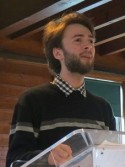 Cole Adams, Kingswood-Oxford
Cole Adams, Kingswood-Oxford